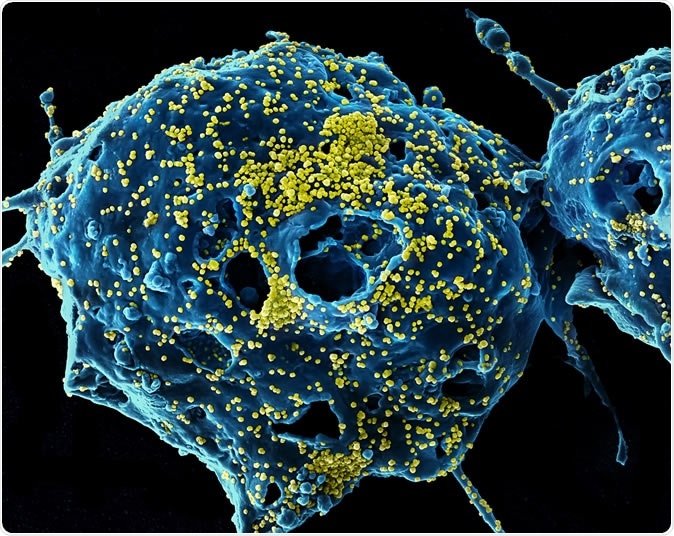Amid the coronavirus disease (COVID-19) global pandemic that is infecting millions of people across the globe, hope sparks as the World Health Organization (WHO) reports that seventy vaccination trials for the novel coronavirus are underway, with three already at the human trial stage.
The COVID-19 pandemic has spread to 185 countries and territories, with 1,979,477 infected and 126,539 succumbing to the disease as of 14 April 2020. Scientists and pharmaceutical companies are racing to determine an effective vaccine to protect against the viral infection. While new drugs are being developed, companies are also seeing if older drugs can be repurposed.
The World Health Organization (WHO) released a document containing all potential vaccine candidates that may help protect populations against the severe acute respiratory syndrome coronavirus 2 (SARS-CoV-2), the virus that causes COVID-19 disease. The virus first emerged in Wuhan City, Hubei Province, in China and has since spread across continents, without an approved treatment or vaccine developed yet.

MERS Virus Particles Colorized scanning electron micrograph of Middle East Respiratory Syndrome virus particles (yellow) attached to the surface of an infected VERO E6 cell (blue). Image captured and color-enhanced at the NIAID Integrated Research Facility in Fort Detrick, Maryland. Credit: NIAID
Three vaccines head the race
The furthest along in the clinical process is an experimental vaccine, which is now in its phase 2 of human trials. Hong-Kong's CanSino Biologics, Inc. and the Beijing Institute of Biotechnology developed the vaccine. Two other vaccines are being tested in humans by U.S. drug makers Inovio Pharmaceuticals, Inc. and Moderna, Inc.
The vaccine developed by CanSino Biologics uses a non-replicating viral vector platform, while it is an adenovirus type 5 vector vaccine. The vaccine developed by Inovio Pharmaceuticals is a DNA-based vaccine, which is a DNA plasmid vaccine Electroporation device, while the one developed by Moderna is an LNPencapsulated mRNA vaccine.
The vaccine candidate built upon the adenovirus-based viral vector vaccine technology platform, which has also been applied to develop an effective vaccine against the Ebola virus infection. In animal studies, the virus has shown promise in inducing a strong immune response.
"Thanks to our collaborators and our diligent team, who worked almost around the clock since late January to develop this vaccine candidate with sound scientific data to support IND filing. Having committed to providing unconditional support to fight against the global epidemic, CanSinoBIO is determined to launch our vaccine product candidate as soon as possible with no compromise on quality and safety," Xuefeng Yu, Chairman, and CEO of CanSinoBIO said.
Meanwhile, Inovio Pharmaceuticals received the green light from the U.S. Food and Drug Administration (FDA) to start its phase 1 clinical testing. The vaccine, called INO-4800, will be used in healthy volunteers to see if it can protect against the coronavirus disease.
"This is a significant step forward in the global fight against COVID-19. Without a new safe and effective vaccine, the COVID-19 pandemic is likely to continue to threaten lives and livelihoods. It also demonstrates the power of our DNA medicines platform to rapidly develop and advance a vaccine for COVID-19 into Phase 1 clinical testing," Dr. J. Joseph Kim, INOVIO's President, and CEO said.
"Our dedicated team of staff, partners and funders have been mobilized since the genetic sequence of the virus became available in early January and continues to work around the clock to ensure that we are rapidly advancing INO-4800 through this Phase 1 study towards planned efficacy trials," he added.
Moderna, a Cambridge biotech company, has also received the approval to start testing its coronavirus vaccine in March. The company uses messenger RNA that carries genetic information from DNA to ribosomes to produce proteins. This type of vaccine is new but promising.
"We call mRNA the software of life. You can copy and paste the information into a lot of drugs by using the same technology. That means the way we make mRNA for one vaccine is exactly the same way we make mRNA for another vaccine," he added. It just carries a different genetic sequence depending on the disease," Stéphane Bancel, CEO of the company, Moderna, said.
Coronavirus global update
As the world grapple to contain the coronavirus spread, scientists race to develop vaccines and therapies for the viral infection. Though promising, it may take about a year before a vaccine is developed and ready for market. The United States reports the most number of COVID-19 cases, with more than 608,000 people infected, and nearly 26,000 people succumbed to the disease.
Spain and Italy follow with 174,060 and 162,488 people infected, respectively. Other countries with high infection toll include Germany with more than 133,000 infections, France with more than 131,000 confirmed cases, and the United Kingdom with more than 94,000 cases.